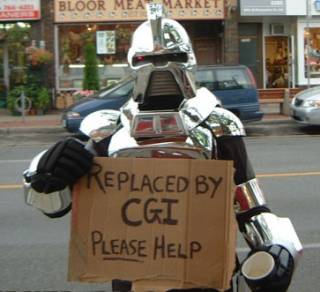
(click here to see a video about their plight)
Read the whole thing!
Since the Industrial Revolution, there have been numerous predictions of falling real wages due to the advent of machines. But across any thirty-year time horizon (some would say fifteen-year, but not I) real wages have risen and in the long run they have skyrocketed. The marginal return to capital has not gone up much if at all.
Even if we have really, really good robots (I still think Deckard was a replicant), they won't substitute for all forms of unskilled labor. Maybe they can drive a car, but will they fluff your pillow? The remaining poor will fill jobs robots cannot handle, own small bits of capital, or live off of charity and transfers. Don't forget, we are talking about a ridiculously wealthy and scientifically advanced world. A small capital investment might carry you through the rest of your life. Plus if robots will be so good, can't they help the rest of us learn some skills or acquire some capital?
The robots also have to compete against technologically augmented humans, whom I suspect will be the real force of the future. Complex biology is hard to master, so let nature handle that and just purchase the mechanical add-ons, no?
So I don't worry about the special features of robot economies. It is simply fears of Malthusian overpopulation but with metal rather than flesh. The difference is that there is a more obvious profit incentive to produce lots of robots, since they can be owned for profit. But modern technology would have pushed up wages even if we had not seen the falling birthrates as of late.
P.S. -- Scroll immediately below or click here to see my previous toaster post.
P.P.S. -- See my previous posts relating to Battlestar Galactica here and here.
No comments:
Post a Comment